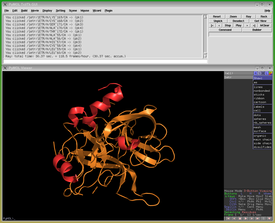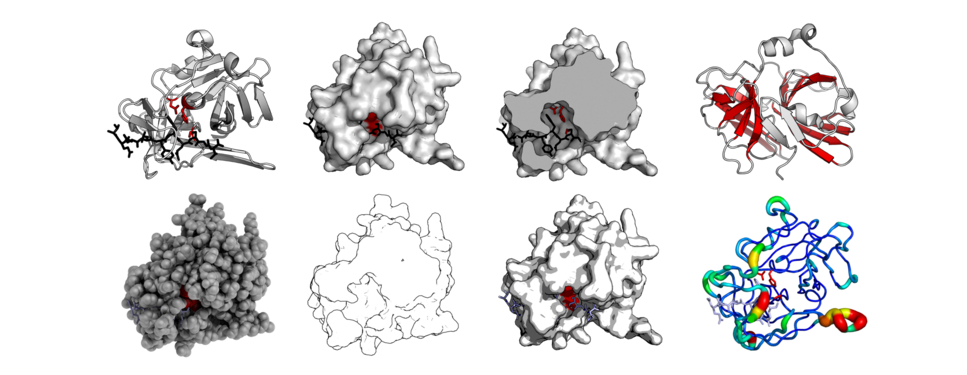PyMOL
This article needs additional citations for verification. (June 2008) |
 A PyMOL instance, with the Viewer and GUI visible. | |
| Original author(s) | Warren Lyford DeLano |
|---|---|
| Developer(s) | Schrödinger, Inc. |
| Stable release | 1.8.4.1
/ 21 November 2016 |
| Repository | |
| Written in | C, C++, and Python |
| Operating system | Cross-platform |
| Type | Molecular modelling |
| License | Python license[1] |
| Website | www |
PyMOL is an open-source, user-sponsored, molecular visualization system created by Warren Lyford DeLano and commercialized initially by DeLano Scientific LLC, which was a private software company dedicated to creating useful tools that become universally accessible to scientific and educational communities. It is currently commercialized by Schrödinger, Inc. PyMOL can produce high-quality 3D images of small molecules and biological macromolecules, such as proteins. According to the original author, almost a quarter of all published images of 3D protein structures in the scientific literature were made[when?] using PyMOL.[citation needed]
PyMOL is one of a few open-source visualization tools available for use in structural biology. The Py portion of the software's name refers to the fact that it extends, and is extensible by the Python programming language.
PyMOL uses OpenGL Extension Wrangler Library (GLEW) and Freeglut, and can solve Poisson–Boltzmann equations using the Adaptive Poisson Boltzmann Solver.[2] PyMOL uses Tk for the GUI widgets; Native Aqua binaries are available for OS X through Schrödinger.
Non-free binaries
On 1 August 2006, DeLano Scientific adopted a controlled-access download system for pre-compiled PyMOL builds (including betas) distributed by the company. Access to these executables is now limited to paying customers but is free for students and teachers. However, the current source code continues to be available at no cost, as are older pre-compiled builds. While the build systems for other platforms are open, the win32 build system is not (although Windows binaries are available online). Non-students and teachers can either compile an executable from the source code or pay for a subscription to the support services to obtain access to pre-compiled executables.
Acquisition of PyMOL by Schrödinger
On 8 January 2010, Schrödinger, Inc. reached an agreement to acquire PyMOL. Schrödinger took over development and maintenance, as well as support and sales of PyMOL, including all current subscriptions. Schrödinger also continues to actively support the open-source community of PyMOL.
Gallery
-
Example of some molecular editing features of PyMOL, dihedral bond rotation and interactive molecular relaxation with "Sculpting mode", these are useful features for preparation of input geometry for quantum chemistry software
-
The same protein structure (TEV protease - PDB: 1LVB) rendered in different modes. Standard cartoon, surface, cut-through of surface, highlighted barrels, 'QuteMol'-like, 'Goodsell'-like, glossy-surface, and b-factor putty
See also
- List of molecular graphics systems
- Gabedit
- Molden
- Molekel
- Abalone
- RasMol
- SAMSON
- Molecular modelling
- Software for molecular mechanics modeling
References
External links
- Official website
- PyMOL Wiki
- Read-only PyMOL Wiki Mirror
- Schrödinger LLC
- Molecular movie-making with PyMOL

